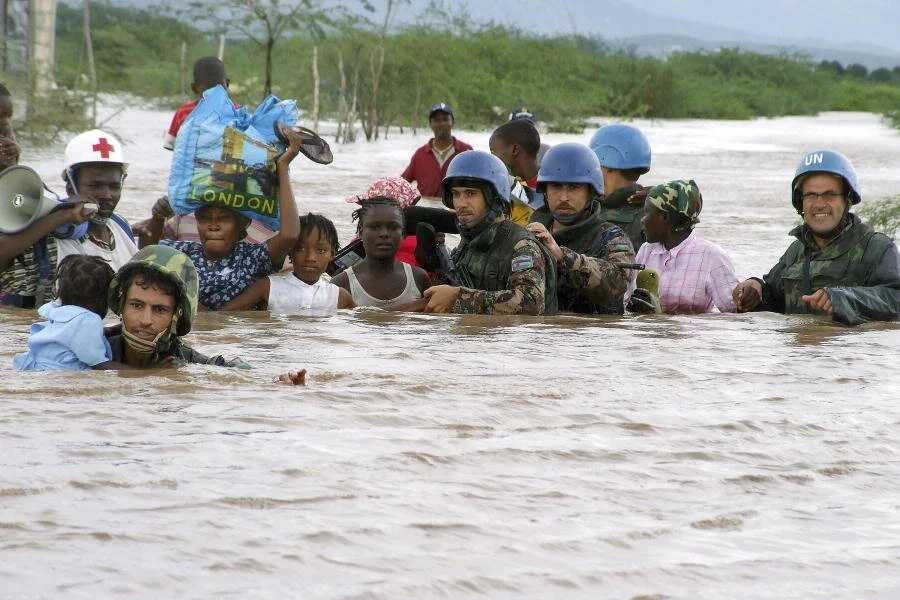UN rescue mission in Haiti, 2008.
How do you feel about the climate emergency? How do you feel about your personal contribution to emissions of greenhouse gases? What do you see in your future?
And if you’re a facilitator, or have some other role in helping other people have conversations about the climate, what do you do when strong emotions show up?
Recently, I’ve found myself holding the space for different kinds of conversations about climate change. These are not conversations aimed at agreeing strategy, policy or organisational action-planning, although I facilitate those too. These are more delicate, raw and personal.
Courage and leadership
For one group of 20, who were mostly colleagues from the same sustainability organisation, we spent an hour and a half sharing feelings, fears and hopes under the overarching theme of courage and leadership in the face of the climate and ecological emergency. I chose to set this up with some clear signals about the kind of conversation it was going to be. We sat in a circle, at the centre of which was a bowl of pebbles, a stack of postcards, coloured pens and a pine cone. Ground rules were also on the floor: simple handwritten A4 paper with ‘be kind’, ‘share the air’, and ‘speak for yourself’. There was also a baby in the room. It was that kind of organisation!
The opening round of introductions and ‘why did you choose to come to this conversation today’ took around half an hour: a third of our time. This is much longer than I might usually plan for but it was so worth it. People really heard each other. They shared grief, fear, anger, pain, a sense of being lost or adrift, but also excitement, optimism and camaraderie.
We reflected together on leadership, through choosing images from the postcards which illustrated what leadership meant to each person. And we closed with another round, this time asking ‘what gives you courage?’. A strong theme in the responses was being with others who share the same world view and are acting to make things better.
Facing our footprints
Another was a workshop session as part of a coaching masterclass, in the South West of England. The participants were people who act as volunteer coaches for colleagues from public sector organisations like local authorities and the fire and rescue service, as well as some independent coaches. None of them specialised in climate change. Before the day, they were encouraged to do this short environmental footprint assessment. We began the session by sharing the results, and lining up in order of the size of our footprints. This was a deliberately provocative start, which we then debriefed by asking ‘how do you feel about your result?’. Because these people were all coaches, I felt able to jump straight to that level of disclosure of feelings. Some people described a sense of satisfaction, even smugness, at being among the most ‘good’. Others were disappointed and felt unjustly criticised by the tool: it didn’t allow them to get brownie points for some of the things they felt they did well. Others chose to criticise the circumstances in which they find themselves: the system that forces them to drive, for example, rather than use public transport.
The next step was to identify 'the stories we tell ourselves' about our individual environmental impacts - patterns of sense-making or rationalisation, archetypal and heard again and again in similar situations.
We moved on to working in three small groups, focusing on what people thought they could do to improve their impact,
in their personal life,
as coaches, and
in their working life outside of coaching.
The exercise was a variation on the one described here, and is included in a forthcoming book on coaching supervision edited by Michelle Lucas.
These conversations can be hard. Some people are hungry for information about what they can do, but either dissatisfied that the actions don’t seem to be at the same scale as the problem or – if they do seem at the right scale – feel impossible to implement. Some people are overwhelmed by their fear or anger or grief, and veer between wanting to face it and sit with it, or wanting to be distracted from it. As a facilitator, I am glad to be able to ‘hold the space’ for the conversation, without judgement or rescuing, available for whatever people want to bring in to it.
Making the Path by Walking
This was first published in October’s Making the Path by Walking newsletter. Scroll down to the bottom of the page to subscribe.

